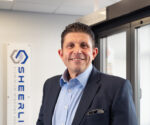Paul Bygrave, Director of Incarnation Window Systems
First job: Pot washer! At the Michelin Star Paris House in Woburn, though…
When did you first join/set up the current company? We founded Incarnation on October 8th 2012.
Most useful/favourite gadget: Scannable App on my iPhone. It means I can instantly take quotes from customers and send them through to our estimators for quicker turnaround times!
Favourite/most useful website: Salestracker by Insight Data has been very useful for a start-up like us.
Business person you admire: Pablo Picasso – he perfectly blended unrivalled artistic input with realistic commercial output.
Recommended hotel for business: The Hilton Park Lane was rather nice for the G Awards back in November!
Favourite UK restaurant: I’d have to say Midsummer House, Cambridge. Daniel Clifford is very good.
Best business decision: Negotiating a decent rate to clean and polish my parents’ shoes when I was a child. I used the money to buy my pet hamster Linford – and it taught me the value of money.
Other interests: FA Level football coaching, reading George Orwell over and over again, singing and playing music in general.
Working Week: My working week varies due to the nature of the industry, but every day starts with an 8am meeting with my right-hand man and our production supervisors, either in the office or via conference call if I’m on the road. This is where we set out the day’s objectives, discuss our sales and fabrication schedules, and, inevitably, discuss the evening’s football results. If I’m in for the week, I can usually be found working on production scheduling, new product design, sales and marketing projects, looking for new fabricators, reviewing quality control reports and answering the odd call for technical advice. If I have appointments, then I’ll be out on the road. We’ve got customers from Perth to Penzance, so I get about a bit!
Working Location: Incarnation started out life from a couple of workbenches and a desk on a mezzanine floor at Roseview’s main factory in Olney, Buckinghamshire. Five years on, we work out of a dedicated 3,000 square foot unit adjacent to Roseview, and we’re filling it already. The office space is clean and organised. I’ve got whiteboards full of concepts and design ideas, financial targets and sales appointments. It’s all held together with strong personalities and even stronger coffee!
 Incarnation made a phenomenal start to 2017. From November 2016 until June, we enjoyed amazing growth. We were breaking sales records most weeks, and added new people and new machines to ensure we could keep up with demand – meaning, crucially, that we could maintain our trademark ten-day lead times and outstanding overall service. Trade custom is our bread and butter, but we suddenly found ourselves with an influx of commercial enquiries too, which we worked hard to successfully convert.
Incarnation made a phenomenal start to 2017. From November 2016 until June, we enjoyed amazing growth. We were breaking sales records most weeks, and added new people and new machines to ensure we could keep up with demand – meaning, crucially, that we could maintain our trademark ten-day lead times and outstanding overall service. Trade custom is our bread and butter, but we suddenly found ourselves with an influx of commercial enquiries too, which we worked hard to successfully convert.
Between June and October, that growth started to level out, as expected. Attitudes towards secondary glazing have shifted considerably over the last five years, but there’s still a perception that it’s very much a seasonal product. A lot of companies see it purely in terms of improving thermal efficiency, something we’re obviously challenging, but it does tend to mean sales drop off somewhat as the year goes on. What’s more, while that period sees a lot of commercial secondary glazing work become available as schools, colleges and universities shut for the summer, a lot of that work tends to go to a couple of the more established players on the market – companies who, in the past, might have been the only ones capable of taking on jobs of that size. Again, we’re manoeuvring into a position to challenge this. All that said, we’re now on the up again. November 2017’s results were up 26% on the same month in 2016 – and we’re expecting 2018 to be massive. This year, our overriding aim is to continue to establish ourselves as one of the UK’s leading secondary glazing manufacturers, known for perfect products that are delivered on time, every time. We want to keep building relationships with new customers, while nurturing the ones we’ve worked so hard to gain already.
I’ve got no doubt 2018 will bring challenges – particularly the political and economic climate, neither of which we can do anything about. Personally, I thought the Budget was underwhelming, although I can see the potential positives of abolishing stamp duty for first-time buyers – it’s bound to increase property valuations, which homeowners may then feel the need to justify by making home improvements. But at ground level, I’m confident we’ve got the strength and flexibility to adapt to whatever comes our way. Every single member of the Incarnation team is committed to the business, and achieving the best possible outcomes for our clients, and with that in the locker, I know there’s plenty we can achieve. In the year to come, I want to significantly grow that team, too.
It looks as if the market for bespoke products is having a resurgence, and that’s great for us – everything we do is bespoke, sometimes ultra-bespoke, and we strive to meet customer briefs at the most competitive price possible. Not just in fenestration, but in the economy more generally, people are now looking for a complete, seamless service from start to finish – lead generation, marketing support, excellent products and excellent aftercare. At Incarnation, that’s exactly the sort of business we want to become. On the products front, we’re now putting serious thought into the next generation of Incarnation secondary glazing. As ever, our most important collaborators are our customers. In our business, customer feedback is taken extremely seriously. As soon as it comes in, positive or negative, we share it with everyone in the business, and discuss it openly. That said, we often have to ask for it, so we must be doing something right!
My advice to anyone in glazing looking to take their business to the next level is to pursue your professional development as far as you can. Strive for a reputation at whatever you do. Nowadays, there are so many opportunities to gain skills and accreditations, and they’re a fantastic way to stand you and your business out from your competitors. Machinery is expensive, but quickly starts to pay for itself – and if money’s tight, they can easily replace a large number of shop floor staff. But it’s something you need to think long and hard about – a machine can process a lot more product per hour than a human being can, but can it think outside of the box? I’m a strong believer that there will always be a place for people in the workplace, even after the rise of the robots. It sounds obvious – but perhaps the best bit of advice I can give is to know your market inside and out. If you’ve constantly got your ear to the ground, you can find lucrative opportunities where you least expect them.
Tel: 01234 240404











